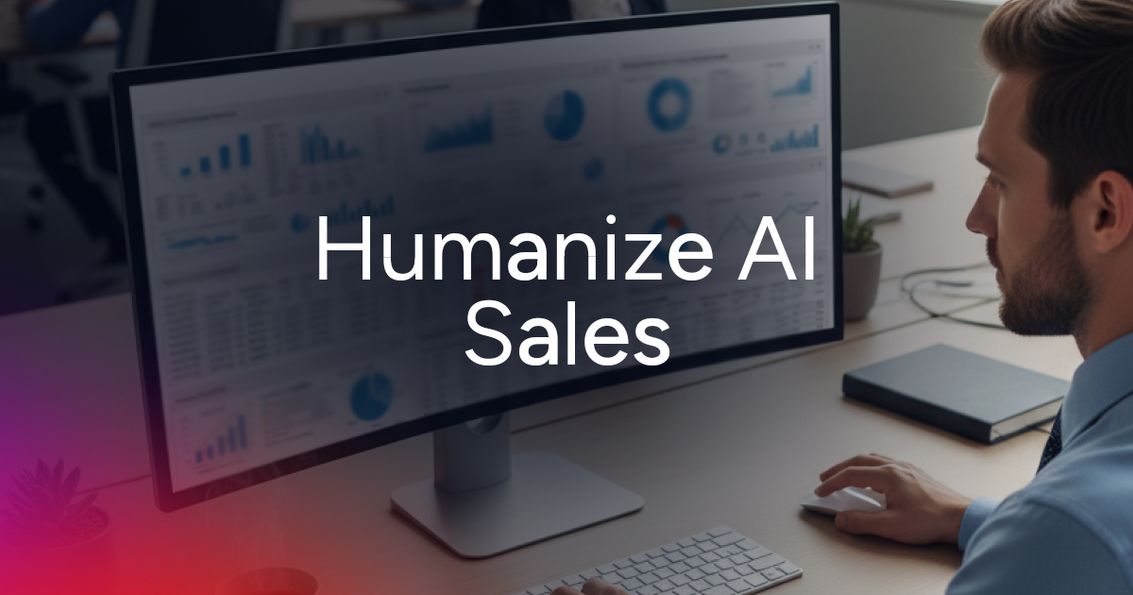AI tools are automating the busywork that consumes sales teams' time: research, data entry, list building, and follow-up scheduling. This shift frees reps to focus on high-value activities like discovery calls, demos, and relationship building. According to Jeb Blount, CEO of Sales Gravy and co-author of The AI Edge, AI in sales isn't replacing sellers. It's giving them more time to forge authentic relationships that drive sustained revenue growth.
What Is AI in Sales?
AI in sales applies machine learning, natural language processing, and predictive analytics to automate tasks, surface buyer signals, and guide seller actions. Instead of spending hours on manual research, data entry, and list building, reps get real-time recommendations on which accounts to target, when to reach out, and what to say. This transforms sales from a volume game into a precision operation.
AI in sales includes:
Lead scoring: AI ranks prospects by likelihood to convert based on behavioral and firmographic signals
Account prioritization: AI surfaces high-intent accounts by analyzing website visits, content engagement, and trigger events
Outreach personalization: AI drafts targeted messaging based on prospect behavior and recent activity
CRM automation: AI updates records, enriches data, and logs activities without manual input
How AI in Sales Works
AI in sales operates through a three-step process:
Data ingestion: AI pulls information from CRM systems, intent data providers, engagement platforms, and public sources
Pattern recognition: Machine learning models analyze historical outcomes, buyer behavior, and market signals to identify what drives conversions
Actionable output: AI generates recommendations, automates workflows, or surfaces insights that guide next steps
Top Benefits of AI in Sales
AI delivers three core benefits that directly impact revenue outcomes: more time for selling, better account prioritization, and higher conversion rates. These measurable improvements change how sales teams allocate effort and close deals.
More Time for Selling
"Think of the 70% of tasks that don't directly contribute to closing deals: updating CRM records, scheduling follow-ups, sorting through data," Blount says. "AI allows you to get rid of those tasks, so you can focus on the 30% that matter."
"We're going to use AI tools to get our time back, so we can focus on what we do best: having conversations with clients and helping them solve their problems," says sales consultant Anthony Iannarino, co-author of The AI Edge.
AI automates the tasks that eat up rep time:
CRM updates and data entry
Meeting scheduling and follow-up reminders
Contact research and list building
Activity logging and note-taking
Sales teams using AI-powered tools like ZoomInfo Copilot report spending more time on high-value activities: discovery calls, demos, and deal progression.
Better Account Prioritization
"AI also helps you identify high-priority leads by processing patterns that you may not even be aware of," ZoomInfo Enterprise Account Manager Will Frattini says. "It's not just about intent data. AI can analyze combinations of signals like changes in company leadership, recent funding announcements, or engagement with your content to predict when a prospect is ready to make a purchase."
These signals include:
Intent data spikes showing active research
Recent funding announcements or leadership changes
Content engagement and website visits
Technographic fit and firmographic alignment
Reps stop wasting time on cold accounts. They focus on prospects showing real buying signals.
Higher Conversion Rates
"It allows salespeople to approach prospects at the perfect time, with messaging that resonates with their current needs," Frattini says.
When reps reach out at the right moment with relevant context, conversion rates improve. AI doesn't just identify who to contact. It tells you when and why they're ready to buy, so your outreach lands with precision instead of getting ignored.
AI in Sales Use Cases
AI in sales isn't a single feature. It's a set of capabilities that address specific workflow problems across prospecting, research, outreach, and operations. Here's where AI delivers the most impact.
Prospecting and Account Prioritization
AI's predictive capabilities help sales teams identify which potential customers are most likely to convert and when. By analyzing past interactions, customer behaviors, and market trends, AI enables predictive prospecting, which provides insight into which accounts offer the highest potential return.
AI analyzes combinations of signals to surface high-value prospects:
Leadership changes at target accounts
Recent funding announcements
Content engagement and website visits
Social media activity and hiring patterns
Technographic changes indicating buying intent
With these buying signals that act as predictive insights, sales teams prioritize efforts on prospects most likely to convert. This increases win rates and ensures reps invest time in leads that offer the highest potential return.
Research and Meeting Prep
AI aggregates account and stakeholder context so reps stop tab-hopping before calls. Instead of piecing together information from LinkedIn, company websites, news sources, and CRM notes, reps get everything in one view.
AI surfaces the context reps need for effective conversations:
Company news and recent announcements
Org structure and reporting relationships
Recent interactions and engagement history
Relevant talking points based on account activity
Reps walk into meetings prepared. They reference specific challenges, recent milestones, and relevant context that builds credibility from the first minute.
Personalized Outreach at Scale
Modern sales tools can flood prospects with automated, impersonal outreach. AI used properly, with accurate data, solves this by enabling personalization at scale.
AI synthesizes prospect behavior data (website visits, content engagement, social media activity) and produces actionable outreach recommendations. By drafting targeted messaging based on these signals, AI helps salespeople tailor communications to specific needs, driving higher engagement and response rates.
"AI doesn't just automate outreach. It makes it smarter. It tells you exactly when to reach out, what to say, and what the customer might be thinking, based on real-time signals. This is what takes your sales process to the next level," Frattini says.
AI-powered personalization works across three layers:
Timing: AI identifies when prospects are actively researching solutions or showing buying intent
Messaging: AI drafts outreach based on recent signals, content engagement, and account context
Human review: Reps add judgment, context, and relationship insight before sending
The key: AI drafts the first pass. Reps refine and personalize before hitting send. That's how you scale outreach without sacrificing relevance.
CRM Automation and Data Enrichment
AI automates CRM updates, enriches records with fresh firmographic and contact data, and reduces manual data entry. This keeps your CRM current without requiring reps to spend hours logging activities and updating fields.
AI handles the data work that slows down sales teams:
Auto-updating contact records with job changes and new information
Flagging stale data and outdated records
Enriching accounts with technographics and firmographic details
Logging activities and syncing engagement data
Clean data means better handoffs between sales and marketing, more accurate forecasting, and fewer deals lost to bad contact information.
How to Deploy AI in Sales
Deploying AI in sales isn't about turning on a tool and hoping for results. It requires a trusted data foundation and integration with your existing sales stack. Get these two pieces right, and AI delivers measurable impact. Skip them, and you're scaling errors instead of outcomes.
Building a Trusted Data Foundation
AI's effectiveness depends on the quality of the data it's working with, and teams that implement and rely on AI must be vigilant about the fact that AI can rapidly scale mistakes if the data is inaccurate.
"AI can generate insights and predictions at lightning speed, but if your data is flawed, you're essentially weaponizing those errors. That's why it's critical to ensure that your data is clean, up-to-date, and reliable," Iannarino says.
Integrating with Your Sales Stack
AI tools should connect to the systems your team already uses. That means integration with CRM platforms, sales engagement tools, conversation intelligence software, and marketing automation systems.
AI integration points include:
CRM systems like Salesforce and HubSpot
Sales engagement platforms for sequencing and outreach
Conversation intelligence tools for call analysis and coaching
Marketing automation platforms for lead handoff and scoring
The goal: AI should fit into existing workflows, not create new ones. Reps shouldn't have to log into another tool or switch contexts to get AI-powered insights.
Measuring AI Sales Success
AI investments need to show up in revenue outcomes. Track the metrics that matter: pipeline created, conversion rates, rep productivity, and sales cycle length. These indicators tell you whether AI is improving efficiency or just adding noise.
Metric | What It Measures | Why It Matters |
|---|---|---|
Pipeline created | New opportunities generated | Shows AI's impact on top-of-funnel |
Conversion rate | Deals won vs. opportunities | Shows AI's impact on deal quality |
Rep productivity | Activities per rep per day | Shows time savings from automation |
Sales cycle length | Days from opportunity to close | Shows AI's impact on velocity |
Focus on outcomes, not activity. More emails sent doesn't matter if conversion rates stay flat. More meetings booked only matters if they turn into pipeline.
The Future of AI in Sales
AI automates low-value tasks, offers data-driven insights, and predicts next steps. But salespeople remain essential: they build relationships, solve complex problems, and close deals. AI complements sellers. It doesn't replace them.
"AI will make us more efficient, but it's the human-to-human conversations that will close the deals," Blount says. "AI is a tool to help us get there, but it can't replicate empathy, emotional intelligence, or the ability to navigate complex sales discussions."
The next wave of AI in sales will bring agentic AI and autonomous workflows. AI assistants will handle more than recommendations. They'll execute tasks, manage follow-ups, and orchestrate multi-step sequences without manual intervention. But even as AI takes on more responsibility, the human judgment that closes complex deals won't disappear.
AI in Sales FAQs
What is AI in sales?
AI in sales uses machine learning and predictive analytics to automate tasks, surface buyer signals, and guide seller actions, enabling reps to focus on high-value conversations instead of manual research and data entry.
How does AI help with sales prospecting?
AI analyzes intent signals, firmographics, and engagement behavior to identify high-priority accounts and surface prospects who are actively researching solutions, allowing reps to prioritize outreach efforts effectively.
Can AI replace salespeople?
No. AI automates administrative work and surfaces insights, but complex deals still require human judgment, relationship building, and strategic problem-solving.
What metrics should I track for AI sales success?
Focus on pipeline created, conversion rates, rep productivity, and sales cycle length to measure whether AI improves efficiency and revenue outcomes.
How do I integrate AI into my existing sales stack?
AI tools should connect directly to your CRM, sales engagement platforms, and conversation intelligence software, fitting into existing workflows rather than creating new ones.
To see how AI-powered GTM intelligence can help your team prioritize accounts, personalize outreach, and close deals faster, talk to our team.


